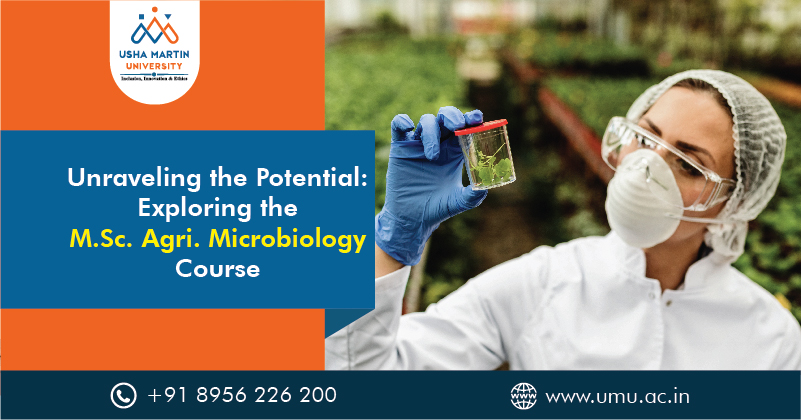
MBA Programs Admission Open 2024–25 at Top MBA University in Jharkhand
April 13, 2024
Exploring the Top 10 Career Opportunities with a BA English (Hons.) Degree
April 17, 2024M.Sc. Agri. microbiology course is the most promising career option in today’s dynamic landscape of agriculture. The course program is innovative and the role & study of microbiology in sustaining healthy yield and productivity is important. The course curriculum has a vast scope where students get to learn about nutrient cycling, plant growth promotion, soil health, and disease suppression. This post-graduate level program is designed to enable students with a comprehensive understanding of the microbial world and its relevance and limitations in agriculture industry. Usha Martin University, top agriculture college in Ranchi offers the most prestigious program in M.Sc. Agriculture-Microbiology with most promising career options.
Eligibility Criteria & Duration: M.Sc. Agri. Microbiology –
Eligibility Criteria:
Educational Qualifications: Candidates must hold a bachelor’s degree in a relevant field, such as B.Sc. Agriculture, Microbiology, Biotechnology, or related disciplines, from a recognized university or institution.
- Minimum Aggregate Score: Most institutions require candidates to have a minimum aggregate score in their undergraduate degree, often around 50% depending on the institution’s requirements.
- Duration: 2 Years
M.Sc. Agri. Microbiology: Application Process –
University release notifications for M.Sc. Agri. Microbiology admissions well in advance, usually through their official websites and advertisements in newspapers or online portals.
- Application Form: Interested candidates need to fill out the application form provided by the university.
- Submission of Documents: Along with the completed application form, candidates are required to submit relevant documents such as academic transcripts, mark sheets, certificates, and any other documents specified by the institution.
- Application Fee: Candidates may need to pay an application fee, the amount of which varies depending on the institution’s policies. This fee is usually paid online or through a bank draft.
Core Subjects in M.Sc. Agriculture -Microbiology –
- Microbial Diversity and Ecology: This subject allows the students to learn about vast diversity of microorganisms inhabiting agricultural ecosystems. The study includes nutrient cycling, and the dynamics of microbial communities within soil and plant environments.
- Soil Microbiology: Soil is a complex ecosystem teeming with microbial life. M.Sc. Agriculture course program allows you to learn about bacteria, fungi, protozoa, and viruses in soil fertility along with disease suppression for sustainable agricultural practices. The study of soil microbial diversity, nutrient transformations, and microbial-mediated plant-microbe interactions has given an edge in agriculture Technology
- Plant-Microbe Interactions: Plants are directly related to microbes there by affecting plants health, growth and yield.In this subject, students establish a symbiotic associations, such as mycorrhizae and rhizobia, as well as plant-pathogen interactions and mechanisms of disease resistance.
- Biotechnology in Agriculture: Advances in biotechnology have revolutionized agricultural practices. This subject introduces students to various biotechnological tools and techniques used in crop improvement, biocontrol, and bioremediation. Topics may include genetic engineering, microbial inoculants, and bioprocessing.
- Microbial Biotechnology and Bioinformatics: With the advent of genomics and bioinformatics, the study of microbes has entered a new era. Students learn to harness bioinformatics tools for microbial genome analysis, met genomics, and functional genomics, paving the way for innovative applications in agriculture.
Practical Training:
The M.Sc. Agri. Microbiology course emphasizes hands-on training and experiential learning. Students engage in laboratory exercises, fieldwork, and research projects to gain practical skills and insights. Laboratory sessions may involve isolation and characterization of agriculturally important microorganisms, molecular techniques, and bioassays to evaluate microbial activity.
Field visits and internships provide students with real-world exposure to agricultural settings, where they can observe microbial processes in action and interact with farmers, agronomists, and industry professionals. These experiences not only enhance practical skills but also foster critical thinking and problem-solving abilities.
Career Prospects after M.Sc Agri. Microbiology Course:
Graduates of the M.Sc. Agri. Microbiology course are well-equipped to pursue diverse career paths in agriculture, biotechnology, academia, research, and industry. Some potential career avenues include:
- Research Scientist: Conducting fundamental and applied research in agricultural microbiology, exploring novel microbial strains, and developing microbial-based products for crop enhancement and disease management.
- Agricultural Consultant: Providing expertise to farmers, agribusinesses, and governmental organizations on soil health management, biofertilizers, microbial pesticides, and sustainable agriculture practices.
- Quality Assurance Manager: Ensuring the safety and efficacy of microbial products through quality control measures, regulatory compliance, and monitoring of production processes.
- Academician: Pursuing doctoral studies and contributing to academic research and teaching in agricultural microbiology, biotechnology, or related fields.
- Entrepreneur: Establishing startup ventures focused on microbial biotechnology, agri-inputs, bioprocessing, or precision agriculture solutions.
Top Agriculture College in Jharkhand for M.Sc Agri. Microbiology –
The M.Sc. Agri. Microbiology course is a transformative educational experience with a blend of theoretical and practical learning. This course program prepares the aspirants into well read professionals in the field of agriculture where there skill set and agricultural advancement can increase the productivity of the agriculture yield and promote growth that is sustainable.
As far as the admission to M.Sc. Agri. Microbiology courses is a competitive process that evaluates candidates based on their academic credentials, performance in entrance examinations, and other relevant criteria. By understanding the eligibility criteria and following the application and selection process diligently, aspiring students can increase their chances of securing admission to reputable institutions offering this specialized program.






